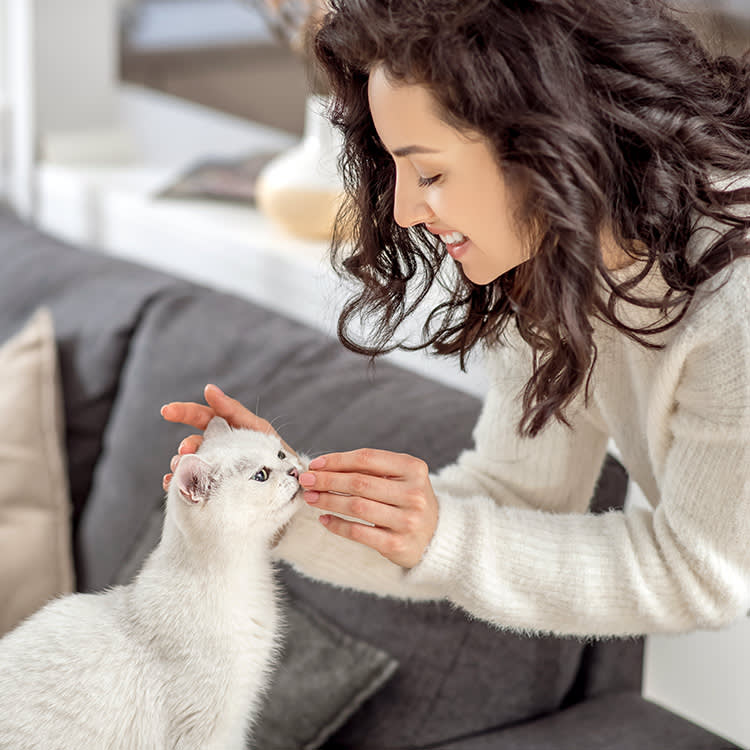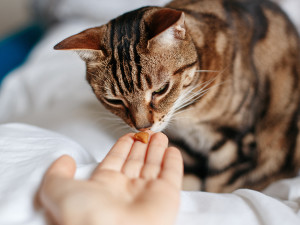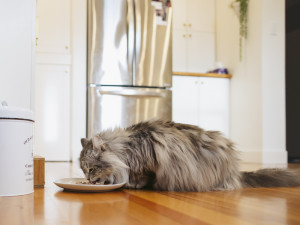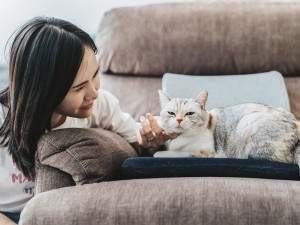Does My Cat Need Supplements?

Share Article
In this article:
Benefits of Cat Supplements Types of Cat Supplements What Vitamins Do Cats Need? How Do I Know If My Cat Needs Supplements? Should I Consult the Vet Before Giving My Cat Supplements? Vitamins and Supplements That Are Bad for Cats
If you’re on social media at all, you’re likely constantly getting targeted with the latest supplement gummies, powders, etc. While you might be all set in that department (and really need those ads to stop popping up!), the one curled up on your lap, purring away, could benefit from an extra vitamin boost.
Cat supplements can provide essential nutrients for your cat, including omega-3 fatty acids for skin and joint health, probiotics for digestive health, and glucosamine and chondroitin for joint support. First, remember that it’s important to consult with your veterinarian to determine if your cat needs supplements and which type is right for them. Some cats may not need any supplements, while others may benefit from certain types.
What are supplements for cats?
Many pet parents take supplements for their health and want the same benefits for their feline friends. Supplements are products that provide nutrients to the body in order to lower the risk or reduce the effects of certain diseases. Supplements for cats come in various forms, including tablets, capsules, powders, liquid, or gel.
Most healthy cats who are fed a proper diet do not need additional supplements. Diets that are formulated for cats, complete, balanced, and certified by the Association of American Feed Control Officials (AAFCO) can provide cats with the nutrients they need. Some cats, especially those with nutrient deficiencies or underlying health issues, may benefit from nutritional supplements. Many cats who eat homemade diets require additional supplements to ensure they get adequate amounts of essential vitamins and minerals.

What are the benefits of cat supplements?
Cat supplements are designed to provide additional nutrients to prevent or address specific health concerns. Supplements should not be used in place of a proper diet but rather to support cats and help them live healthier lives. Pet parents may consider giving their cats supplements to:
Address nutrient deficiencies
Support joint health
Promote skin and coat health
Maintain digestive health
Provide immune support
Offer senior support
Address health conditions
Decrease anxiety
What are the common types of cat supplements?
Pet parents want to ensure their cat’s wellbeing, and many ask their veterinarians about the best supplements for cats. The answer depends on the individual cat and the parent’s specific concerns. Commonly used cat supplements include:
Probiotics
Fish oil
Vitamins
Joint supplements
Immune support supplements
Stress and anxiety supplements
Digestive supplements
What vitamins do cats need?
Does my cat need vitamin B?
Vitamin B is a water-soluble vitamin that serves as a catalyst for many of the body’s functions. Vitamin B deficiency in cats can lead to poor growth, low body weight, poor appetite, weakness, neurological signs, and anemia. Vitamin B12 (cobalamin) is particularly important in cats. Cats cannot produce vitamin B12 on their own and must source it from their diet.
Any underlying digestive condition that interferes with nutrient absorption, like diseases associated with the gastrointestinal tract, liver, or pancreas, can lead to low levels of vitamin B12. Signs of vitamin B12 deficiency in cats include vomiting, diarrhea, anorexia, poor body condition, and low blood cell counts. When faced with a cat displaying chronic gastrointestinal issues, many vets will recommend testing cobalamin levels. When vitamin B12 levels are low, supplementation (often via injections) is recommended.
Does my cat need vitamin C?
Vitamin C (ascorbic acid) is a water-soluble vitamin that is important for immune function and its antioxidant properties. It’s also important for tissue growth and helps the body create hormones that regulate blood pressure. Cats are able to produce vitamin C in their liver, so vitamin C deficiency is rarely seen in healthy cats.
Vitamin C supplementation is rarely needed and can cause some kitties harm. Excess vitamin C is turned into oxalate before being excreted in the urine. This extra oxalate can put cats at risk of developing calcium oxalate crystals or stones in their bladders. On rare occasions, veterinarians will reach for vitamin C as part of a treatment plan for critically ill cats in an effort to help support the immune system and the body’s ability to maintain adequate blood pressure.
Does my cat need vitamin D?
Vitamin D is a fat-soluble vitamin, meaning it can be absorbed and stored in the body along with fat. Unlike humans, cats are unable to produce vitamin D from sunlight, so they rely on dietary sources. Vitamin D plays an essential role in the absorption of calcium and phosphorus, and it is vital for healthy bone and muscle function.
Vitamin D deficiency can cause skeletal issues like rickets and osteomalacia — conditions in which cats develop weak, soft bones. Because vitamin D is closely linked to calcium, low levels can lead to muscle weakness, tremors, and seizures. Vitamin D deficiency is most often seen in cats with congenital abnormalities, chronic kidney disease, or being fed unbalanced diets. Because vitamin D is fat-soluble and can build up in the body to the point of toxicity, supplementation is not recommended unless under the guidance of a veterinarian.
Does my cat need vitamin E?
Vitamin E (tocopherol) is a fat-soluble vitamin that serves as an important antioxidant. Some cat foods are formulated with vitamin E to prevent fatty acids from oxidizing and becoming rancid.
Vitamin E deficiency can lead to steatitis (inflammation of fat tissue) in cats. Symptoms of vitamin E deficiency/steatitis include lethargy, poor appetite, abdominal pain, abdominal fluid, and painful nodules under the skin. Feeding a diet that is complete and balanced is important to prevent vitamin E deficiency caused by insufficient dietary intake.
How do I know if my cat needs vitamins or supplements?
Even if your cat has no apparent health issues, talk to your vet before starting supplements. If your cat is not doing well, definitely seek veterinary advice before reaching for supplements. Your vet can use a medical history, physical exam findings, and diagnostic testing to determine if your cat has a specific condition that requires specific treatment and if supplements are appropriate. Symptoms that may cause cat parents to ask about supplements include:
Dull coat and skin
Chronic diarrhea/loose stools
Recurrent constipation
Mobility issues
Anxiety and stress
Viral diseases
Does my cat need probiotics?
Probiotics are the “good bacteria” that help keep the population of microbes balanced. They help maintain a healthy gastrointestinal tract and contribute to immune health. Probiotics are often given to cats that have chronic GI issues, such as vomiting, diarrhea, or recurrent constipation. They are also beneficial to cats with acute diarrhea or that were recently on antibiotics. Many probiotics for cats will contain Enterococcus, Bifidobacterium, Streptococcus, and/or Lactobacillus spp.
Types of probiotics for cats: Probiotics are formulated as powders, capsules, and pastes.
Risks of giving probiotics to cats: Some cats may experience flatulence or abdominal discomfort.
Does my cat need fish oil supplements?
Fish oil is rich in omega-3 fatty acids and is commonly used to help cats with dry, flaky, itchy coats. Fish oil also has anti-inflammatory properties and is sometimes recommended for cats with allergic skin disease, arthritis, chronic kidney disease, heart disease, inflammatory bowel disease, and cognitive dysfunction.
Types of fish oil supplements for cats: Fish oil typically comes in liquid or capsule form.
Risks of giving fish oil to cats: Some cats may experience gastrointestinal upset and weight gain. Less common side effects include pancreatitis, delayed wound healing and changes in blood clotting.
Does my cat need multivitamins?
Most cat foods provide all the essential vitamins and minerals that a cat needs. Cats fed raw, homemade, or incomplete diets are more likely to need supplementation. It’s better to choose a complete and balanced diet. Cats requiring vitamins typically need a specific vitamin in a specific format, so it’s best to work with your vet to opt for a targeted approach, rather than giving a multivitamin that contains more than your cat needs.
Types of multivitamins for cats: Cat multivitamins often come in tablet, powder, or gel forms.
Risks of giving multivitamins to cats: It’s possible to overdose a cat or even cause toxicity with unnecessary vitamin supplementation.
Does my cat need joint support supplements?
Cats can develop arthritis due to abnormal joint development or age-related degeneration. Arthritic cats can have chronic pain and mobility problems that impact daily activities. Joint supplements are often part of a well-rounded plan that can include weight control and exercise.
Types of joint supplements for cats: Chondroprotective drugs, such as glucosamine and chondroitin, are popular choices to protect joint cartilage. They are often formulated as chewable treats.
Risks of giving joint supplements to cats: Some cats experience GI upset.
Does my cat need immune support supplements?
L-Lysine is an amino acid used for immune support in cats dealing with chronic viral conditions, particularly feline herpesvirus. While there is no cure for the virus, supplementation can help decrease the frequency and severity of flare-ups.
Types of immune support supplements for cats: L-Lysine can be found in gel, paste, powder, or chewable forms.
Risks of giving immune support supplements to cats: Side effects are uncommon, but some cats may experience mild GI upset.
Does my cat need stress and anxiety supplements?
Stress can manifest in many ways in cats, including undesirable behaviors, urinary issues, and GI upset. Cat parents may reach for supplements to help their cats feel more relaxed.
Types of stress and anxiety supplements for cats: Products for stress and anxiety range from synthetic pheromones (diffusers, collars) to amino acids like L-tryptophan and L-theanine (chewable treats).
Risks of giving stress and anxiety supplements to cats: Because behavior can be difficult to manage in cats, some products may not be effective.
Does my cat need digestive supplements?
Some cats — especially long-haired cats — benefit from hairball-control supplements. These products coat the fur that cats swallow during grooming and help the fur pass through the intestines easily.
Types of digestive supplements for cats: Hairball supplements are liquids or gels.
Risks of giving digestive supplements to cats: Some cats may experience diarrhea or flatulence.
Should I consult the vet before giving my cat supplements?
Always consult with your veterinarian before starting any supplements, even if your cat seems healthy. Your vet can provide guidance on the most appropriate supplement for your goals and help you avoid unnecessary products or those that may lead to accidental overdose or toxicity.
Another important note is the lack of regulation in supplement products. Unlike drugs, supplements do not have to go through rigorous testing for safety and efficacy. Your vet can help you find reputable brands.
Are there any vitamins or supplements that are bad for cats?
Some vitamins and supplements can easily be overdosed in cats and some are outright toxic. Those that are easily overdosed include:
Vitamin D
Vitamin C
Calcium
Multivitamins
Those to completely avoid include:
Human multivitamins
Iron supplements
Garlic supplements
Green tea extract
Any product formulated with xylitol
Supplements containing essential oils
FAQs (People also ask):
How can I give my cat supplements?
Cat supplements come in many forms including capsules, liquids, powders and pastes. Administration depends on the product and what your cat will tolerate.
Do cat supplements have side effects?
Cat supplements can have unwanted side effects like gastrointestinal upset. Talk to your veterinarian if your cat is not doing well on a recommended supplement.
Are there risks associated with cat supplements?
There are risks associated with giving a cat supplements, especially if they are not needed. Some vitamins and supplements can have detrimental effects or cause toxicity if given unnecessarily.
References:
Vitamin B12 in Cats: Nutrition, Metabolism, and Diseaseopens in new tab
Vitamin C in Health and Disease: A Companion Animal Focusopens in new tab
Disorders Associated with Calcium, Phosphorus, and Vitamin D in Catsopens in new tab
The Role of Vitamin D in Small Animal Bone Metabolismopens in new tab
Probiotics, Prebiotics, Synbiotics, and Intestinal Health of Dogs and Catsopens in new tab

Dr. Alycia Washington, DVM, MS
Alycia Washington is a small-animal emergency veterinarian with over 10 years of experience based in North Carolina. She works as a relief veterinarianopens in new tab and provides services to numerous emergency and specialty hospitals. She also works as a veterinary writer with a focus on educating pet parents.
Related articles
![A woman feeding food to her cat at a dining room table]()
Is Homemade Cat Food Good for Your Kitty?
The best ingredients to include when considering a home-cooked diet for your cat.
![A grey cat looking at a dish of fish]()
The 5 Best Fish Oils for Cats
The next best thing to branzino, omega-3s support your cat’s skin, brain, joint, and heart health.
![Gray and white striped cat is scratching his ear]()
What’s Up With My Cat’s Skin?
Everything you need to know about cat allergies, according to three veterinary dermatologists.
![A woman petting her cat on the couch]()
6 Surprising Signs of Arthritis in Cats
They’re not what you’d think, according to veterinary behaviorist Dr. Margaret Gruen.
![A senior cat is held in their owner's lap]()
How to Care for Your Senior Cat
From taking them to the vet more often to giving them a hand with grooming, older kitties need a little extra TLC.
![Young caucasian cheerful blonde girl sitting and hugging her lovely cocker spaniel dog in cafe.]()
10 Longevity Tips From People Whose Pets Have Lived Incredibly Long Lives
Follow these vet-backed tips to help your best bud live a healthy and full life.









